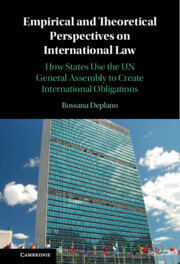 Empirical and Theoretical Perspectives on International Law
Empirical and Theoretical Perspectives on International Law Book contents
- Empirical and Theoretical Perspectives on International Law
- Empirical and Theoretical Perspectives on International Law
- Copyright page
- Dedication
- Contents
- Figures
- Tables
- Acknowledgements
- Introduction
- 1 Unpacking the Practice of the General Assembly
- 2 The Legal Significance of Resolutions at the Adoption Stage
- 3 The Legal Significance of Resolutions within Domestic Legal Systems
- 4 The Legal Significance of Resolutions in International Practice
- 5 Revisiting the Concept of Legal Significance of Resolutions
- Conclusions
- Appendix Empirical Research Design
- Index
Introduction
Published online by Cambridge University Press: 21 July 2022
- Empirical and Theoretical Perspectives on International Law
- Empirical and Theoretical Perspectives on International Law
- Copyright page
- Dedication
- Contents
- Figures
- Tables
- Acknowledgements
- Introduction
- 1 Unpacking the Practice of the General Assembly
- 2 The Legal Significance of Resolutions at the Adoption Stage
- 3 The Legal Significance of Resolutions within Domestic Legal Systems
- 4 The Legal Significance of Resolutions in International Practice
- 5 Revisiting the Concept of Legal Significance of Resolutions
- Conclusions
- Appendix Empirical Research Design
- Index
Summary
The Introduction provides an overview of the four streams of thought about the legal significance of resolutions. It shows that General Assembly resolutions do not fit the paradigm of Article 38 of the Statute of the International Court of Justice and, in any case, the traditional signposts contained in that provision do not explain the basis of legal obligation in the contemporary international society. It provides an argument for developing an empirically grounded analysis of how resolutions acquire legal significance in different contexts through state practice. It subsequently outlines the structure of the analysis, which culminates with the formulation of an original theory of legal significance of resolutions. The latter develops in three different contexts – namely, at the adoption stage, within domestic law and in international practice.
Keywords
- Type
- Chapter
- Information
- Empirical and Theoretical Perspectives on International LawHow States Use the UN General Assembly to Create International Obligations, pp. 1 - 24Publisher: Cambridge University PressPrint publication year: 2022
